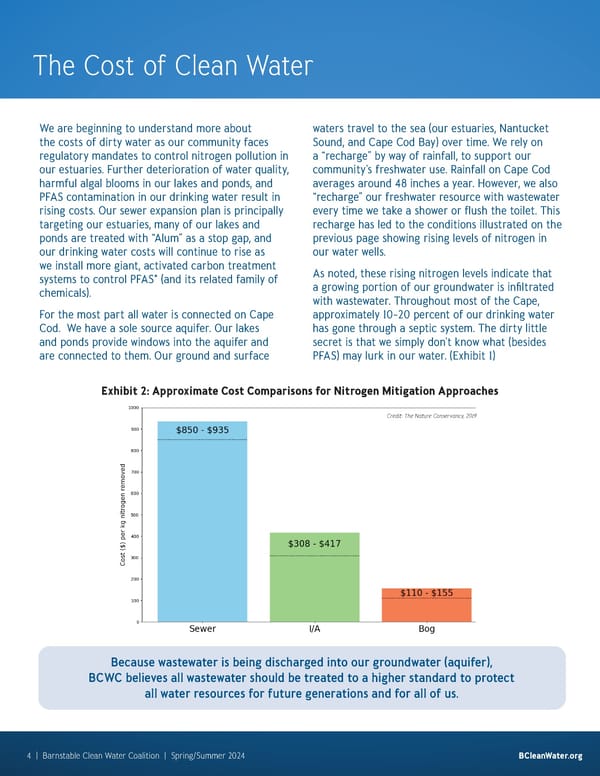The Cost of Clean Water We are beginning to understand more about waters travel to the sea (our estuaries, Nantucket the costs of dirty water as our community faces Sound, and Cape Cod Bay) over time. We rely on regulatory mandates to control nitrogen pollution in a “recharge” by way of rainfall, to support our our estuaries. Further deterioration of water quality, community’s freshwater use. Rainfall on Cape Cod harmful algal blooms in our lakes and ponds, and averages around 48 inches a year. However, we also PFAS contamination in our drinking water result in “recharge” our freshwater resource with wastewater rising costs. Our sewer expansion plan is principally every time we take a shower or 昀氀ush the toilet. This targeting our estuaries, many of our lakes and recharge has led to the conditions illustrated on the ponds are treated with “Alum” as a stop gap, and previous page showing rising levels of nitrogen in our drinking water costs will continue to rise as our water wells. we install more giant, activated carbon treatment As noted, these rising nitrogen levels indicate that systems to control PFAS* (and its related family of a growing portion of our groundwater is in昀椀ltrated chemicals). with wastewater. Throughout most of the Cape, For the most part all water is connected on Cape approximately 10-20 percent of our drinking water Cod. We have a sole source aquifer. Our lakes has gone through a septic system. The dirty little and ponds provide windows into the aquifer and secret is that we simply don’t know what (besides are connected to them. Our ground and surface PFAS) may lurk in our water. (Exhibit 1) Exhibit 2: Approximate Cost Comparisons for Nitrogen Mitigation Approaches Credit: The Nature Conservancy, 2019 Because wastewater is being discharged into our groundwater (aquifer), BCWC believes all wastewater should be treated to a higher standard to protect all water resources for future generations and for all of us. 4 | Barnstable Clean Water Coalition | Spring/Summer 2024 BCleanWater.org
 BCWC Newsletter Spring/Summer 2024 Page 3 Page 5
BCWC Newsletter Spring/Summer 2024 Page 3 Page 5